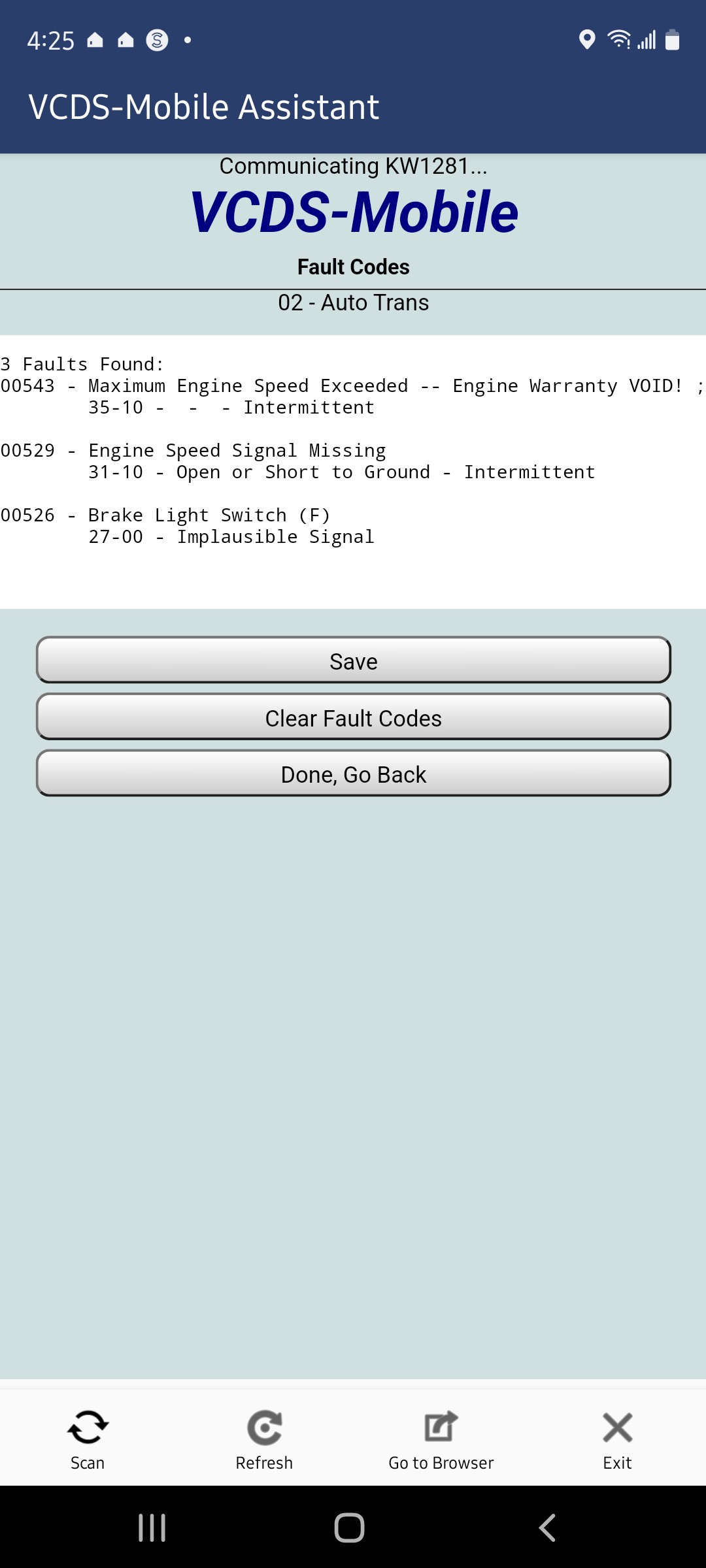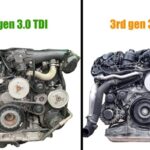Experiencing a sudden engine stall while driving can be incredibly frustrating and concerning. If you’re a 2001 VW Passat 1.8T owner facing a no-start condition after a highway breakdown, you’re in the right place. Let’s dive into diagnosing this issue, drawing from a real-world scenario and providing expert insights to get your Passat back on the road.
Symptoms and Initial Observations
The owner of a 1999 VW Passat (similar generation and engine to the 2001 model) reported their vehicle cutting out while driving on the highway. Several key symptoms were noted at the time of the breakdown:
- Sudden Engine Stall: The engine died abruptly while driving at highway speeds.
- Limp Mode Indicator: A black frame around the PRND symbols on the instrument cluster, potentially indicating limp mode, though this could also be a secondary symptom of engine failure.
- Oil Light Illumination: The oil light came on, which is common when an engine stalls and loses oil pressure.
- Clicking Noise: A distinct clicking sound was heard from under the driver’s side dashboard.
After pulling over, the initial restart attempts were met with brief engine starts followed by immediate stalling. Subsequent attempts in the accessory position only produced the clicking noise.
Initial Troubleshooting Steps
The owner wisely began troubleshooting with some common and accessible components:
- Fuel Pump Relay Check and Replacement: The fuel pump relay was pulled and inspected for visible damage, then reinstalled. When this didn’t resolve the issue, it was replaced with a known good spare. This step targets a frequent cause of fuel delivery problems.
- Ignition Switch Replacement: A spare new ignition switch was installed, addressing another potential culprit in starting and electrical issues in VWs of this era. However, after this replacement, the car failed to start at all.
Despite these efforts, the no-start condition persisted. It’s important to note that the timing belt was confirmed to be intact, and the accessory belt spins during cranking, ruling out major mechanical failures like a broken timing belt or starter issues. Additionally, the fuel pump was heard humming when the key is turned to the accessory position, suggesting it is receiving power, although a “crunch” noise at the end of the hum raises a potential concern.
Diagnostic Trouble Codes (DTCs) Analysis
Scanning the vehicle revealed crucial Diagnostic Trouble Codes (DTCs) which offer valuable clues:
- 01314 – Engine Control Module (ECM) – No Communication: This is a critical code indicating a lack of communication with the engine computer. This could stem from various issues ranging from wiring problems to a faulty ECM itself.
- 01316 – ABS Control Module – Check DTC Memory: This code points to the ABS system and suggests there may be stored codes within the ABS module that could be relevant. ABS issues can sometimes interfere with other systems.
- 17978 – Engine Start Blocked by Immobilizer: This code suggests the immobilizer system is preventing the engine from starting. The immobilizer is an anti-theft system that must recognize the key for the car to start.
- 16706/P0322 – Engine Speed Sensor (G28) – No Signal: This code directly relates to the Crankshaft Position Sensor (CKP sensor). This sensor is vital for engine timing and fuel injection. An intermittent signal or no signal will prevent the engine from starting.
- 17911/P1503 – Load Signal from Generator Terminal DF – Implausible Signal: This code relates to the alternator and its load signal. While less directly related to starting, it could indicate electrical system anomalies.
- 00668 – Supply Voltage Terminal 30 – Voltage too Low: This code indicates a low voltage condition at Terminal 30, which is a main power supply terminal. Low voltage can cause a multitude of electrical problems and prevent modules from functioning correctly.
The owner initially focused on the Crankshaft Position Sensor (G28) due to the P0322 code and replaced it. However, this did not resolve the no-start issue, indicating the problem may be more complex.
Expert Troubleshooting Steps for a 2001 VW Passat 1.8T No Start
Based on the symptoms and DTCs, here’s a systematic approach to further diagnose the no-start issue on this 2001 VW Passat 1.8T:
-
Address Low Voltage (00668):
- Battery Check: Start by thoroughly testing the battery’s voltage and cranking amperage. A weak battery can cause low voltage issues and trigger various sensor and module malfunctions.
- Charging System Inspection: Check the alternator’s output to ensure it’s charging correctly. A faulty alternator can lead to low voltage over time.
- Ground Connections: Inspect all main ground connections, especially those in the engine bay and around the battery. Loose or corroded grounds are a common cause of electrical problems in older vehicles.
-
Investigate ECM Communication (01314):
- Wiring and Connections: Carefully examine the wiring harness and connectors leading to the ECM. Look for any signs of damage, corrosion, or loose connections. Pay particular attention to the power and ground wires for the ECM.
- ECM Power Supply: Verify that the ECM is receiving power and ground. Use a multimeter to check for voltage at the ECM power pins and continuity to ground at the ground pins. Consult a wiring diagram for the 2001 VW Passat 1.8T to identify the correct pins.
- CAN Bus Issues: The ECM communicates with other modules via the CAN bus. A fault on the CAN bus can disrupt communication. Diagnostic tools can often test CAN bus integrity.
-
Immobilizer System (17978):
- Key Recognition: Ensure you are using the correct key and that the immobilizer system is recognizing it. Sometimes, a key can lose its programming.
- Immobilizer Module: In rare cases, the immobilizer module itself can fail. Diagnosis of the immobilizer system often requires specialized tools and knowledge.
-
Crankshaft Position Sensor Circuit (P0322/16706):
- Wiring to Sensor: Since the sensor was already replaced, focus on the wiring between the CKP sensor and the ECM. Check for continuity, shorts, and proper voltage at the sensor connector.
- Sensor Reluctor Ring: In rare cases, the reluctor ring (tone wheel) on the crankshaft that the sensor reads can be damaged. This is less likely but worth considering if wiring and sensor checks are inconclusive.
-
Clicking Noise Diagnosis:
- Relay Check: The clicking noise from under the dash could indicate a relay issue. Try to pinpoint the exact location of the clicking and identify the relay. Consult a wiring diagram or relay location chart for the 2001 VW Passat 1.8T.
- Electrical Short: Clicking relays can also be a symptom of an electrical short circuit or overload. Further electrical testing may be needed to identify a short.
-
Fuel Pump Noise:
- Fuel Pump Health: The “crunch” noise from the fuel pump is unusual. While the pump may be humming, it doesn’t guarantee it’s delivering fuel at the correct pressure and volume. A fuel pressure test is recommended to verify fuel delivery.
Seeking Expert Community Input
Troubleshooting complex automotive issues like this can be challenging. Sharing this detailed information with the online automotive community, particularly forums and groups dedicated to VW Passats or 1.8T engines, is an excellent next step. Experienced mechanics and VW enthusiasts online may offer valuable insights based on similar experiences.
Key questions to ask the community:
- Has anyone encountered similar symptoms and DTC combinations on a 2001 VW Passat 1.8T?
- Are there common wiring or component failure points known to cause these issues in this model?
- Any recommendations for specific diagnostic steps or tests to perform next?
By systematically addressing each potential issue and leveraging community knowledge, you’ll increase your chances of successfully diagnosing and repairing your 2001 VW Passat 1.8T and getting back on the road.

